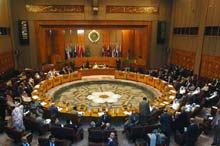
This is a general view the Arab Foreign Ministers
meeting at the Arab League's headquarters in Cairo, Egypt, Saturday July 15,
2006. -Xinhua
Arab foreign ministers, who gathered here for an emergency meeting, on
Saturday urged the international community, especially the UN Security Council,
to intervene and stop an escalating conflict in the Middle East.
At the end of the one-day meeting, the ministers issued a resolution to urge
the Security Council to take an immediate step to enforce a ceasefire and lift
an Israeli blockade on Lebanon.
The resolution also condemned Israeli military offensive in south Lebanon and
the Palestinian territories, while voicing full solidarity with Lebanon against
the Israeli offensives.
"The Israeli aggressions amounted to war crimes and crimes against humanity,"
said the resolution, which also expressed regret over a U.S. veto on a draft
resolution condemning the Israeli onslaught.
Arab League Secretary-General Amr Moussa said after the meeting that the
Middle East peace process has failed.
"All of the mechanisms, including the international quartet, have failed to
push ahead with the peace process," Moussa said.
The quartet -- the United States, Russia, the European Union and the United
Nations -- sponsors the peace process in the Middle East.
The current situation in the Middle East resulted in anger and frustration,
said Moussa, adding that such a situation was the immediate result of a trend by
some major powers to give Israel the upper hand in the peace process.
Moussa made the remarks at a joint press conference with State Minister for
Foreign Affairs of the United Arab Emirates Mohamed Hussein al-Shaali, whose
country currently holds the presidency of the Arab Foreign Ministers Council.
Al-Shaali said that decisions by Arab foreign ministers included political
and diplomatic moves at international, regional and Arab levels aimed at ending
Israeli aggressions on Lebanon and the Palestinian territories.
Palestinian Foreign Minister and senior Hamas member Mahmoud al-Zahar was not
present, and Director of the Palestine Liberation Organization Political
Department Farouk Qaddoumi replaced him at the gathering.
During the meeting, Lebanese Foreign Minister Fawzi Salloukh presented the
participants with a draft resolution, in which he condemned Israel's military
offensive and called on Arab nations to support Lebanon' rights to "resist
aggression in all rightful ways."
Salloukh, walking out of the meeting hall, denied reports that Arab foreign
ministers were at odds with each other during the meeting.
Meanwhile, a three-member team sent by UN Secretary-General Kofi Annan to
find a peaceful solution to the ongoing crises also met with Moussa, Qaddoumi
and foreign ministers of Egypt, Saudi Arabia, Jordan, Oman and Qatar on the
sidelines of the meeting.
UN special envoy to the Middle East Terje Roed-Larsen said at a press
conference that the team was concerned with protecting civilians and
infrastructure, according to Egypt's MENA news agency.
Roed-Larsen said that it was important for Palestinian militant groups and
Lebanese Hezbollah militants to release captured Israeli soldiers.
Tensions in the Middle East have been dramatically heightened since Israel
started a military offensive against Lebanon on Wednesday and pressed ahead with
a massive air and ground operation on the Gaza Strip more than two weeks ago.
Some 75 Lebanese, most of them civilians, have been killed and more than 200
injured in Israeli attacks launched in the wake of across-border attack by
Lebanese Hezbollah militants Wednesday morning, during which two Israeli
soldiers were captured and eight others killed.
While in the Gaza Strip, Israel stepped up a military operation in a bid to
rescue a kidnapped soldier and halt Palestinian rocket attacks.
Both Hezbollah and Palestinian militants demanded that Israel release
prisoners held in Israeli jails in exchange for the captured soldiers, but
Israel rejected the swap idea.



